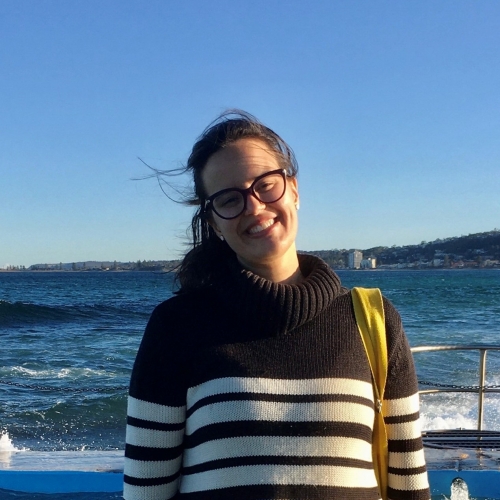
Greta Paget
The University of New South Wales
Greta Paget is currently in honours year of Applied Maths at UNSW, working in physical oceanography. She started her undergraduate degree in science majoring in Physics – oddly enough, in high school she didn’t think she was sufficiently interested in maths to pursue it at university, though when it came to anything physics-y where she could see the phenomena she was studying in the real world,Greta Paget couldn’t wait to learn more! Thanks to some very inspiring teachers later in high school and in her first year maths courses,She then became more interested in understanding the maths behind the science, added a second major in Physical Oceanography, and now here she is! When she is not studying the ocean, I enjoy going for ocean swims and coastal walks.
Can you give me a quick overview of the type of mathematics you are studying and its potential impacts for the broader community ?
I’m studying the dynamics of how ocean eddies (rotating bodies of water which can be on the order of 10-100km in size) cluster together and transport water across ocean basins. Understanding such transport is necessary in determining how eddies move heat and salt around the ocean, which is important for understanding weather systems and improve long-term climate models for climate change research.
How did you get into mathematics/statistics/data science? Was there someone or something that inspired you to this field?
After having teachers in late high school and early university who sparked my interest, I took an additional maths course in third year to gain a bit of background on a physics subject which I was taking concurrently. The lecturer for this course spoke about his research in physical oceanography and climate science, and I really wanted to learn more! It’s such an important area of study, but up until that point I hadn’t really been aware that it was possible to enter the field from an Applied Maths background.
You received a scholarship to attend AMSI Summer School 2022. How important was this in terms of your ability to attend, fully participate in the program and meet others studying in similar fields?
As the program was online this year there were far fewer associated expenses, however having the cost of coursework covered certainly made it easier for me to participate fully in the program.
The purpose of Summer School is to give students an opportunity to develop their mathematical skills, meet like-minded people and network with potential employers. What was the most valuable part of the program for you? Was it the course content or the people you met? Do you have new ideas for your work/research or see it in a new light?
It was all equally valuable! The coursework really solidified my understanding from previous courses and built on my past knowledge, and it was fantastic to hear from other students about their own research and get some ideas for new methodologies to apply to my thesis.
Summer School included a special Careers Day program which aims to help give students an idea of the kinds of career paths available to maths graduates in industry and private sector research areas. Were you previously aware of the types of industry opportunities available to mathematical science graduates? Would you consider working with industry? Do you feel better equipped to explore career options in the mathematical sciences after attending AMSI Summer School?
AMSI Careers Day really broadened my horizons in terms of possible industry employers I could work with after Honours. I was looking into industry opportunities before the Careers Day, however I was unsure of what to look for. The Careers Day really gave me a sense of different industry roles, and a starting point for how to find jobs requiring a mathematical background.
AMSI Summer School was held as a virtual event. What was the biggest positive from your point of view holding it in this format and/or the biggest challenge?
I feel that the lecturers put a lot of effort into making the course content accessible by providing resources for solidifying background knowledge of their courses, and by creating forums for students to discuss their course. This made the learning environment very collaborative despite the challenge of engaging students using an online platform.
What advice would you give to someone who is considering applying for Summer School in 2023? Should they apply and why?
Absolutely apply! Aside from the courses, it’s really exciting to be surrounded by people who are as passionate about maths as you are and to have the opportunity to talk about your research and hear about the work of other students.
Where do you want the mathematical sciences to take you? Where do you see yourself in five, ten years time?
In five years time, I hope to have gained some industry experience and be returning to study a PhD in the climate sciences. In ten years time, I hope to be fully immersed in research!

